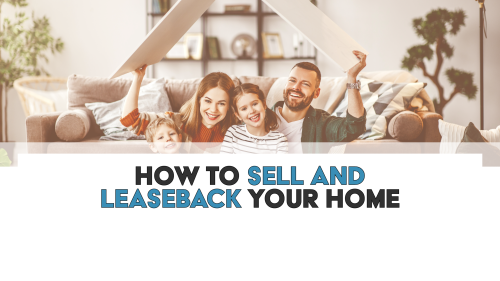
What if you need to sell your home before you can buy a new one? What if you found the perfect buyer, but your new home isn’t ready? What if you don’t want to pull your kids out of school mid-year? What if you need to cash-in on your equity but you can’t qualify for a home loan? What if you’d like to have the power and advantage of making cash offers on your next house? That’s a ton of “what ifs” and there’s many more, but the fact is that no matter your situation, you have options, and your likely best option is doing what’s known as a rent-back agreement, aka a lease-back transaction, which is where a buyer allows a seller to maintain occupancy of a home after it’s been sold. Read on to learn how leaseback agreements work and to see if they are the perfect fit or worst fit for you.
What’s in it for you
Residential real estate leaseback agreements allow homeowners to sell their house, get the cash from the sale, and to continue living in the home in exchange for making rental payments. At Good Vibes Homebuyers, this type of arrangement is known as our sell and stay perk, but other real estate professionals commonly refer to it as a “post-settlement occupancy agreement”, a “rent back arrangement”, or a “sell and stay program”.
Standard contracts to sell and lease a home back from a buyer often include the following provisions:
If not having to move after selling your home sounds like a good idea, or if buying a home and immediately having it rented is appealing, then you’re probably wondering about the risks of sell-leaseback agreements. Before deciding if it’s a good idea for you, consider these common issues.
The issue with leaseback agreements for sellers deals mostly around coming to terms with becoming a tenant in your own home. Nonetheless, there are other risks that could come into play.
The risks of being a buyer in a leaseback agreement are few, but could include:
If you’re thinking about selling and would prefer not having to move on closing day, then finding a home buyer open to doing a rent back agreement could be the perfect arrangement for you. The ability to extend your stay, however, is not the only benefit of rent-back agreements, and below we highlight its other advantages.
Seller rent-back agreements can have distinct advantages for both parties. However, they’re not suited for all situations, so before deciding if a rent-back is ideal for you, sellers should consider their unique circumstances in the context of the below benefits.
If you want to get the best deal on your new home, are ok with pushing back your move in, and are open to being a landlord, then you’re a potential suitor for a rent-back agreement which can benefit buyers in several ways.
Instead of explaining how to sell and rent back a house, it’s most useful to provide examples. Below are recent real-life situations of homeowners who have sold their home and leased it back from Good Vibes Homebuyers by using our sell and stay perk.
Seller Steve recently had major surgery and his health insurance found every reason in the book to not pay. He decided to fight his insurance company, but during the interim, he was on the hook for paying all medical bills. He looked into refinancing, but quickly learned that he didn’t have enough equity, so he contacted Good Vibes Homebuyers (GVH). Seller Steve and GVH agreed to the following: GVH bought the home at market value price with the existing mortgage remaining in-place and Seller Steve received cash for 100% of his equity. He rented-back the house for 360-days with a renewal option, and GVH gave him an option to buy back the house within 3-years at a pre-closing-agreed price.
Seller Sara owned her home for years and had been making the mortgage payment like clockwork. As the economy shifted into a recession, however, Seller Sara got laid off causing her to miss months of mortgage payments. As the bank ramped up the foreclosure process, Seller Sara realized that she was in jeopardy of losing all her equity, which was roughly $100,000. Luckily, she was able to find a new job close to home, so she didn’t want to move, but she also didn’t have enough cash to pay the mortgage arrears. Around this time, her friend told her about local investors who buy and rentback homes due to foreclosure, so she contacted GVH. Seller Sara and GVH agreed to the following: GVH bought her home through its sell your mortgage max solution, GVH made all back payments, Seller Sara received $70,000 cash, she enjoyed a 6-month rent-free period equaling $9,000, and she rented back the house for another 6-months. In so doing, Seller Sara avoided the hassle and expense of moving and put more than ¾ of her equity into her hands instead of the banks.
Despite having been offered his dream job in a new city, Seller Sam was in a pickle! His credit wasn’t great and lending standards were tight. As such, multiple banks declined to approve him for a new mortgage until his debt-to-income ratio improved, and the fastest way for that to happen was by selling his house. If he did sell, he had no place to move. Seller Sam thought he had no options until he searched Google for “companies that buy and leaseback homes”. Seller Sam and GVH agreed to the following: GVH bought the home all-cash, Seller Sam’s mortgage was paid off, and he leased back his house for 180-days. As a result, Seller Sam’s debt-to-income ratio improved, he became eligible for a new mortgage, and he had extra time to find his dream home to match his dream job in his new city.
Seller Sandra needed to move, but it was the middle of the school year, and she knew that her school-aged children would benefit from finishing out the year at their current school. However, the real estate market was strong, so she knew that selling quickly was in her best interest, but she wasn’t sure if she could sell without having to move homes immediately. With no mortgage, she researched her options and found that businesses like GVH specialize in creative finance and offer sell plus lease back perks. Seller Sandra and GVH agreed to the following: GVH bought the house through its sell for more solution, Seller Sandra received a large downpayment, she receives regular monthly payments, she will receive a large loan payoff in 5-years, and she rented back her house through the end of the school year. As a result, her kids were able to finish at their current school, and she was able to use the down payment from GVH on her new home to avoid paying private mortgage insurance. Now, her new home mortgage is paid by the monthly payments GVH makes to her, and she capitalized on a hot market while also avoiding having to move multiple times.
Seller Seth had been thinking for years about moving to a new home, but he never took the steps to sell because he hated the idea of having to endure the 12-step process for selling a home through a realtor. One day, Seller Sam received a GVH postcard which piqued his interest to call our home investors to see how much we might be able to pay. Seller Seth was then presented multiple offers, and the cash only offer was for more than he dreamed possible. He accepted it on the spot, but within hours he thought he had made a mistake. After all, he couldn’t find and move to a new home before the closing date, so he informed GVH Acquisitions Manager Phil Anderson that he was backing out. Phil informed Seller Seth that GVH would buy and rent the house back to him for 120 days to allow him time to find a new home. Seller Seth once again accepted on the spot, and the deal closed as originally scheduled. Fast-forward 100 days and Seller Seth hadn’t yet found his new home. He was panicked! He called Phil who immediately put him at ease with an offer to extend his home rent-back period by another 120 days. In the end, Seller Seth had time to find his dream home and to beat out a dozen other buyers because he used the proceeds from the sale of his old home to offer all-cash to the seller of his new home.
If you need or want cash at your fingertips, want to continue living in your home, and are open to switching from homeowner to renter, then you’re an ideal suitor for Good Vibes Homebuyers sell and leaseback perk! With this incredible service, we will buy your home while you remain as a tenant, giving you the time and resources that you need to achieve your goals. Is a sell-leaseback the right option for you? The answer depends on your unique situation, but learning how we can help make your home equity work for you is a just quick call or form submittal away!
You might also like
Free closing costs. Free Local Move. Zero fees. Sell in 5 days. Sell and stay for 180 days. No equity? Still get $10,000 cash!

Picking the wrong investor can leave you scrambling & empty-handed. Learn how to spot the bad from good investors & see the top reasons to pick Good Vibes Homebuyers.

What sounds better - winning or losing? Home investors don't want you to know these 4 magic negotiation tactics because you'll kick their butt and come out a winner!

Good Vibes Homebuyers might be the perfect option for many Texas property owners needing to sell a house. Ask yourself these questions to see if our investors are right for you.